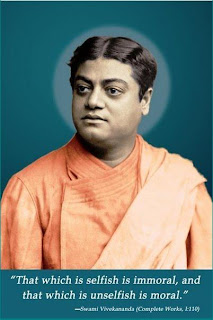This Friday, 23rd was celebrated as Ugadi. During each of these festivals, these words of Swami Vivekananda always come to my mind…. “You Hindus will see in a few years what the Lords does in the West. You are like the Jews of old…. - dogs in the manger, who neither eat nor allow others to eat. You have no religion, your god is the kitchen, your Bible the cooking – pots……You are a few brave lads…Hold on, boys, no cowards among my children…Are great things ever done smoothly ?“
These words of his, needs to be meditated upon, since this is what is blindly followed by us – The so called, EDUCATED BREAD! When he said, “Your God is the kitchen ", he meant, we have confined and celebrated our gods only by preparing delicious foods to eat, and then to sleep with a self depriving solace that we have achieved some thing great.
This is not what India needs. India needs men. Real men {not the age grouped men between 18 and 30 years} but men can come out of there closed doors of there kitchen’s and try to qualify to quantify Swami Vivekananda definition of Men. He defined men, by saying “My child, what I want is muscles of iron and nerves of steel, inside which dwells a mind of the same material as that of which the thunderbolt is made. Strength, manhood, Kshatra-Virya + Brahma-Teja”
Men, who at moments notice can give up every thing and burn themselves at alter of unselfishness and sacrifice themselves for India. This Ugadi is martyrdom day of such Men { Bhagat Singh, Rajguru and Sukhdev } who gave there lives for India, at the tender age of 23 years, 5 months and 25 days. If last day {s} of these immortal men were looked at keenly, on this mortal earth of ours, it is both mesmerizing and sends raptures even to this day.
Bhagat Singh a day before he was pronounced to be hanged had a very sound sleep. In today's date and time our youth do not get sleep if there examinations were scheduled to be held the next day or a day after. But here was Bhagat Singh who even after knowing that he will be hanged next day, had the tenacity and courage to have a sound deep sleep without an iota of worry.
And British Government did not have the courage nor the manhood to wait till scheduled date of pronounced death sentence of Bhagat Singh, Rajguru and Sukhdev but had it proponed by eleven hours.
When Bhagat Singh was called by Jailer for hanging; Bhagat said “Wait two minutes! I am reading last two pages of a book on Lenin. He was also a freedom fighter like me”. After completion of book he happily accompanied the Jailer towards the place where he was supposed to be hanged along with Rajguru and Sukhdev.
There were only five people who were allowed to witness the execution; The Inspector General of Police, The Inspector General of Prison, and Lahore’s Deputy Commissioner, Medical Officer and Superintendent of the Jail.
One among the five asked:
“What was the reason for them to be so happy? “.
For which Bhagat Singh said: “We three are going to be hanged in next few minutes. We are happy because each of you are very fortunate to witness us being hanged till death”.
Another person asked Bhagat Singh: “You will die in next couple of minutes, then why do you consider us to be fortunate? “
For which Bhagat Singh replied: “Out of thirty crore Indian’s, only you five are fortunate enough to see how three Indian’s are going to sacrifice there lives happily in service of there country! – Enjoy!
[ An answer given by 23 years, 5 months 25 days boy].
More words seem unwarranted......
- Thanks
Rajhashekher BC
SUNDAY, 25 MARCH, 2012
Face Book id:
http://facebook.com/Swami.Vivekananda.Myindiaeternal







.jpg)




.jpg)

























.jpg)

